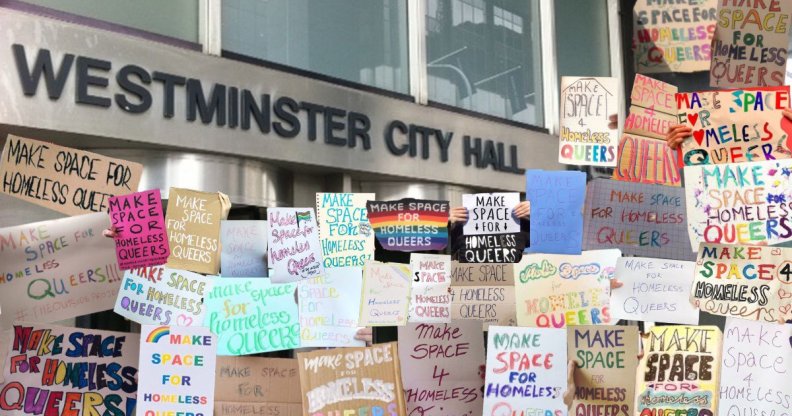LGBT+ kids are ‘120 times more likely to be homeless’ due to hateful, intolerant families

‘Make Space For Homeless Queers’ campaign by the Outside Project, an LGBT+ community centre and shelter in London. (Supplied)
'Make Space For Homeless Queers' campaign by the Outside Project, an LGBT+ community centre and shelter in London. (Supplied)
Support workers are warning that we are in an “epidemic” of homelessness among LGBT+ youth who are kicked out when their families reject their identities.
Dylan Brooks, a trans man who nearly became homeless when he came out to his family and now works to support homeless LGBT+ youth, works at the Compass Community Center in Lake Worth Beach, Florida.
He told local news channel Fox 29 that in his experience, families kick out LGBT+ youth “as soon as they start identifying within the LGBTQ+ community”.
“That is when their family automatically kicks them out,” he said. “It is still happening way too much in 2021. It’s still an epidemic of its own, and it should not be happening, but it still is.”
Brooks now acts as the “point person” for young people who are homeless coming into the community centre, helping them access resources and support. He described the situation that some of them are facing: “On a park bench or, like, they’re taking showers at the beach. That’s no place for an 18-to-25-year-old to live and try to thrive. It’s just not right.”
In the US, one in five trans people will experience homelessness at least once in their lifetime, according to the National Center for Transgender Equality. And young LGBT+ people more broadly are 120 per cent more likely to experience homelessness than their cisgender, heterosexual counterparts in the US.
Julie Seaver, executive director of the Compass Community Center, said all of the youth she works with are facing identity crises.
“LGBTQ youth are 120 times more susceptible to homelessness and most cases it’s due to family conflict,” Seaver said. “Our trans people are the most marginalised, the most discriminated against. They have the highest chance of being victimised, whether it be through employment, housing and, unfortunately, murder and death.”
A helpful way of guiding the work they do at the community centre, Seaver said, is looking to those most vulnerable, like the young trans people that Brooks works with.
“When we increase their quality of life of the most marginalised, we increase the lives of all youth and young adults,” she said. “It’s a scary world out there.”

